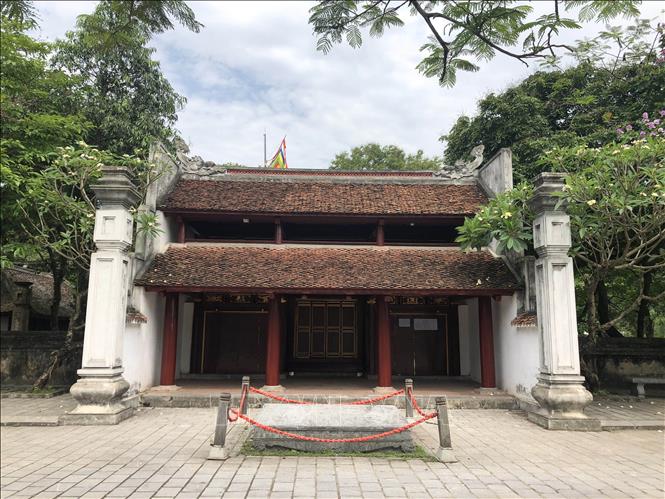Regulations on registration of folk religious establishments and religious establishments as permanent residence in Vietnam
What are the regulations on registration of folk religious establishments and religious establishments as permanent residence in Vietnam? - Ngoc Khanh (Vinh Long)

Regulations on registration of folk religious establishments and religious establishments as permanent residence in Vietnam (Internet image)
Regarding this matter, LawNet would like to answer as follows:
1. Regulations on registration of folk religious establishments and religious establishments as permanent residence in Vietnam
Regulations on registration of folk religious establishments and religious establishments as permanent residence in Vietnam according to Article 7 of Circular 55/2021/TT-BCA are as follows:
- The head of a household living in a lawful place of residence in a folk religious establishment or religious establishment shall be a person who is involved in religious activities and is ordained, appointed to hold a position, selected to hold a hierarchical rank or transferred to carry out religious activities in the religious establishment or represents the folk religious establishment or is assigned to directly oversee and organize religious activities in the folk religious establishment by the representative or management board of the folk religious establishment.
- Documentary proof of being a dignitary, sub-dignitary, monastic or a person involved in religious practices and permitted to work in a religious establishment includes any of the following documents: notification of ordination or election as dignitary; notification of results of sub-dignitary appointment or election; notification of transfer of dignitary, sub-dignitary or monastic or another document according to regulations of law on folk religions and religions.
- Documentary proof of being the representative of a folk religious establishment shall be the document recognizing the holder as the representative of the folk religious establishment or member of the management board of the commune-level People’s Committee.
2. Conditions for permanent residence registration in Vietnam
Conditions for permanent residence registration in Vietnam according to Article 20 of the Residence Law 2020 are as follows:
- Any citizen who has a lawful place of residence under their ownership may register that place as their permanent residence.
- A citizen may register a lawful place of residence that is not under their ownership as their permanent residence with the permission of the household head and owner of such place in the following cases:
= The citizen is someone who comes to live with their spouse; a child coming to live with their parent(s); or a parent coming to live with their child;
= The citizen is an old person coming to live with their biological sibling or grandchild; or a person with very severe disability, a person with severe disability, a person who has lost work capacity, a person suffering from a mental illness or another disease that causes them to lose awareness or behavior control coming to live with their paternal grandparent(s), maternal grandparent(s), biological sibling, biological uncle, biological aunt, biological niece/nephew, biological grandchild or guardian;
= The citizen is a minor coming to live with their great-grandparent(s), paternal grandparent(s), maternal grandparent(s), biological sibling, biological uncle or biological aunt with the permission of their parent or guardian or if they have no parent; or a minor coming to live with their guardian.
- Excluding the cases mentioned in Clause 2 of Article 20 of the Residence Law 2020, a citizen may register a lawful place of residence that they rent, borrow or stay in as their permanent residence on the following conditions:
= The owner of the lawful place of residence agrees to let the citizen register the location that they rent, borrow or stay in as their permanent residence and the household head agrees to let the citizen register the location as their permanent residence with the household;
= The condition for minimum floor area stipulated by the provincial People’s Council is satisfied, which shall be more than 08 m2 of floor/person.
- A citizen may register a folk religious establishment or religious establishment with housing as an auxiliary work as their permanent residence in any of the following cases:
= The citizen is involved in religious activities and is ordained, appointed to hold a position, selected to hold a hierarchical rank or transferred to carry out religious activities in the religious establishment;
= The citizen represents the folk religious establishment;
= The representative or management board of the folk religious establishment agrees to let the citizen register the establishment as their permanent residence for the citizen to oversee and organize religious activities in the establishment directly;
= The representative or management board of the folk religious establishment or the head or representative of the religious establishment agrees to let the citizen, who is a child, person with very severe disability, person with severe disability or helpless person, register the establishment as their permanent residence.
- A person receiving care or support may register their social support facility as their permanent residence with the permission of the facility head or register their caregiving household as their permanent residence with the permission of the household head and owner of the lawful place of residence.
- A person living or working on a vehicle on an itinerant basis may register the vehicle as their permanent residence on the following conditions:
= The person owns the vehicle or is permitted to register the vehicle as their permanent residence by the vehicle owner;
= The vehicle has been registered as prescribed by law; if the vehicle does not require registration, the People's Committee of the commune where it frequently docks or parks must confirm that it is used for living purpose;
= If the vehicle does not require registration or the vehicle registration place is not where it frequently docks or parks, the commune-level People's Committee must confirm that the vehicle has registered to dock or park in the commune frequently.
- The permanent residence of a minor must be registered with the permission of either of their parents or their guardian, unless their place of residence is decided by the Court.
- Citizens may not register the places mentioned in Article 23 of this Law as their new permanent residence, excluding the cases provided for in Point a Clause 2 of Article 20 of the Residence Law 2020.
- Key word:
- permanent residence
- in Vietnam
- Vietnam
- Cases of land rent exemption and reduction under the latest regulations in Vietnam
- Economic infrastructure and social infrastructure system in Thu Duc City, Ho Chi Minh City
- Regulations on ordination with foreign elements in religious organizations in Vietnam
- Increase land compensation prices in Vietnam from January 1, 2026
- Determination of land compensation levels for damage during land requisition process in Vietnam
- Who is permitted to purchase social housing according to latest regulations in Vietnam?
-

- Number of deputy directors of departments in Vietnam ...
- 15:04, 05/03/2025
-

- Cases ineligible for pardon in Vietnam in 2025
- 14:43, 05/03/2025
-

- Decree 50/2025 amending Decree 151/2017 on the ...
- 12:00, 05/03/2025
-

- Circular 07/2025 amending Circular 02/2022 on ...
- 11:30, 05/03/2025
-

- Adjustment to the organizational structure of ...
- 10:34, 05/03/2025
-

- Notable new policies of Vietnam effective as of ...
- 16:26, 11/04/2025
-
.Medium.png)
- Notable documents of Vietnam in the previous week ...
- 16:21, 11/04/2025
-
.Medium.png)
- Notable documents of Vietnam in the previous week ...
- 16:11, 02/04/2025
-
.Medium.png)
- Notable new policies of Vietnam to be effective ...
- 16:04, 02/04/2025
-
.Medium.png)
- Notable new policies of Vietnam effective from ...
- 14:51, 21/03/2025

 Article table of contents
Article table of contents
